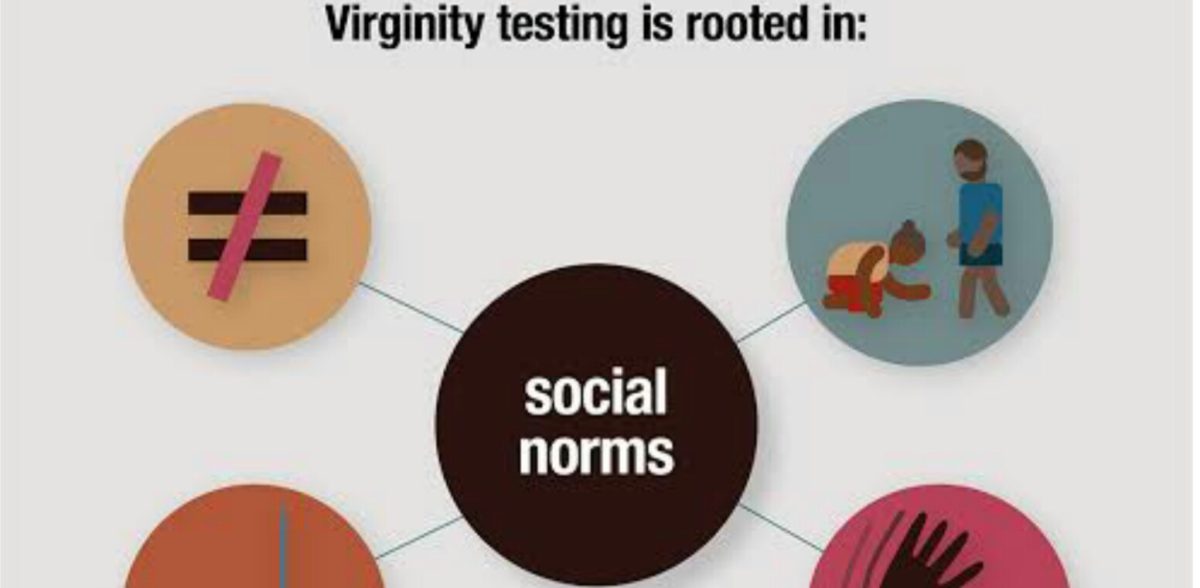Why is my Virginity Your Pride?- Virginity Testing


Anjana is a final year medical student at KMC, Manipal. She strongly believes that words alone have an inexplicable power to bring about the change that we wish to see in our society. She owns a blog which she uses to bring a change in society and to give her readers a gentle soothe.
Why is my Virginity Your Pride?- Virginity Testing
– Anjana Priya J. R.
This is the sad story of various tiny villages and communities across the nation that we, with such pride, call “our motherland”. It is in fact, this pride that is carried onto the pages of our history textbooks. It is this pride that we so carefully instill in the young minds of generations to come. Fortunately or unfortunately, there are two sides to every story. Whilst on one hand we raise the status of little girls to symbolise Goddess Durga herself, on the other hand, we blatantly ignore the patriarchy and violence against women.
What better example of irony can exist, but this?
What is Virginity testing?
Virginity testing in India is supposedly a 400-year-old custom that is still practised amongst various communities. According to this custom, a newlywed couple is provided with a white sheet and is asked to consummate their marriage. The elders of the community wait outside to inspect the sheets later, looking for bloodstains – a proof of the girl’s purity. If failed to bleed, the girl and her family are then subjected to social boycott and assault. They are even forced to pay a huge penalty to the groom’s family and the village panchayat. This is almost as if the marriage is nothing but a business contract. The bridegroom’s family are the buyers, the bride’s family members are the sellers and the bride herself is nothing more than a product for sale. Under the circumstances where defective goods, (in this case, the apparent non-virgin) have been sold, a heavy compensation is to be provided in order for the goods to be accepted. There are also many proud families that aren’t okay with accepting “impure bodies” for their sons, in which case, the marriage is nullified before they step into the market once again, to look for a pure and untainted body that is worthy enough for their privileged sons.
Questions that have remained unasked
The intention of this whole tradition is to regulate the sexual behaviour of women in the community. This, in reality, is a cruel reminder to women, of the patriarchy and their inferior positions in the social hierarchy. The elders of the village panchayats claim that this a way of protecting women from unwanted attention and prying eyes. If so, the question should arise as to why don’t men have the same regulations? It’s only fair that all genders be treated equally, right? The other extremely disturbing question is about the privacy that is being invaded here. What difference would it make if the girl was a virgin or not? What difference would it make if she bled? Or didn’t? Also, what if the woman isn’t a virgin? What difference would it make? How is that a judgment of her character? Why is a woman’s virginity a matter of dignity to the family she belongs to? All humans are rightfully entitled to their own bodies, anatomy and their sexual preferences, regardless of gender.
The legal status
The virginity testing was labelled archaic and was scraped off by the Supreme Court in May 2013, branding it as “hypothetical” and “opinionative”. Reference to past sexual history in rape cases was also banned in the same year. In the case of Lilu@ Rajesh and anr ( ‘anr’ in law, stands for ‘another’ in cases where there is more than one party, instead of writing their names in full.) v. State of Haryana (2013), the Supreme Court ruled that the test violates the right of rape survivors to privacy, physical and mental integrity and dignity. The Maharashtra State Government did away with the chapter on “Signs of Virginity” which was earlier a part of the medical syllabus under Forensic Medicine and Toxicology.
Voices that rose against the act
One of the communities that widely practice virginity testing is the Kanjarbhat community, a tribe that has migrated to parts of Maharashtra and Gujarat. Although the Maharashtra State Government criminalized caste panchayats in July 2017, this caste panchayat has its own rules and it continues to exercise power within the community. When the couple, Krishna and Aruna Indrekar decided to stand up against the practice, their community socially boycotted them. The “Stop the V ritual” is a WhatsApp group begun by two cousins Vivek and Priyanka Tamaichekar. It was when Vivek and his fiancée were forced to undergo the test, that they took to various social media platforms to speak against it. They were joined by many like-minded individuals in expressing their disapproval against the practice.
The consequences
Sadly, this custom has been followed by a few communities for such a long time now, that many have come to accept this as just another routine. Hardly do they realize the tremendous pain and embarrassment it causes to women, leaving them permanently traumatized. Scientific facts prove that not all women bleed during their first sexual intercourse. The hymen could tear even on excessive exertion or various surgical interventions. Although many have raised their voices against virginity testing, it is challenging to get rid of age-old traditions. Even if there’s a change in future, it will be a very slow, traumatizing and violent process. Now, it is up to us whether we choose to stand up to abolish this heinous practice or remain silent and let it be a stain on our proud Indian heritage.
The opinions expressed are of the writer.
Sources:
- https://www.ncbi.nlm.nih.gov/pmc/articles/PMC6547601/
- https://indianexpress.com/article/gender/the-humiliating-virginity-tests-for-brides-a-reality-in-indias-
kanjarbhat-community-5051712/
